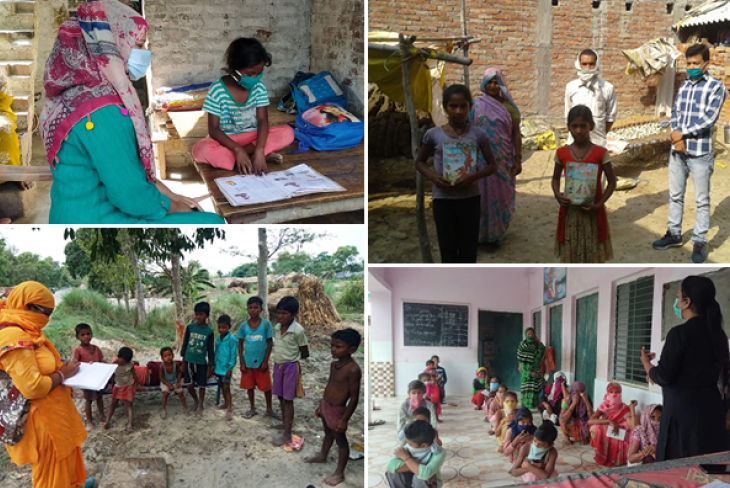The COVID-19 crisis is adversely affecting the well-being of children, with the impact being most acute on children belonging to marginalized sections of the society. They are being exposed to increased vulnerabilities when it comes to their protection, nutrition, health and education. Starting June 2018, ActionAid Association, in collaboration with UNICEF and Aditya Birla Capital Limited (ABCL), has been running an initiative called ‘Nai Pahal’ in Uttar Pradesh to identify and mainstream out-of-school children, covering 20 districts of the state. This intervention has also been working towards activating education governance systems and sensitizing communities on the importance of education, besides addressing issues of child labour and child marriage in the state. A network of over 5,300 community-based Education Volunteers under this initiative have been playing a vital role in meeting the above objectives.
During these challenging times of COVID pandemic too, more than 2,000 Education Volunteers have stepped forward to ensure continuity of education of children from vulnerable communities and low-income households, and children of daily wagers and migrant workers. Based in the same villages as the children they are supporting, these volunteers have been motivating parents of these children to ensure their continued education. Moreover, recognizing that the pandemic could lead to dropouts and increased number of out-of-school children, these volunteers have started encouraging parents to enrol their children in schools once the schools reopen.
Besides, these volunteers have been reaching out to out-of-school children in their neighbourhood and giving them free tuitions to teach them reading, writing and arithmetic and to ensure they reach parity with other children their age and get admission in age-appropriate classes – all of this while following physical distancing and all other necessary precautions. They adopt fun-learning methods to engage the never-enrolled children in order to ease their apprehensions and create a desire within them to learn. Happy with the new fun-learning activities they learn, several children have started practising them at home with their siblings. Furthermore, as a result of the encouragement by volunteers, several parents have stopped engaging their children in any sort of work amounting to child labour. In fact, many of them are now even taking an active part in supporting their children’s learning. While some parents are teaching their children basic arithmetic using household items like utensils and wooden sticks, some others can be seen using vegetables and fruits at home to help their children learn more about their typology etc. Often, before going to work, they assign their children tasks such as memorizing poems, stories and multiplication tables, and check the status when they return from work. As on June 30, 2020, these Education Volunteers have been able to reach out to a total of 45,258 children (including 22,098 girls) from 29,287 families in 3,822 villages. They have also identified 3,761 out-of-school children with a view to mainstreaming them, including several from migrant families.
Besides engaging on the subject of the right to education for every child, the Education Volunteers are sensitizing communities on how they can access rations through the Public Distribution System. They are also supporting labourers to get registered through The Building and Other Construction Workers (BOCW) website to facilitate their access to the various schemes and entitlements meant for them. They are also helping people to get work under the Mahatma Gandhi National Rural Employment Guarantee Act (MGNREGA). In light of the reverse migration amid the pandemic, these volunteers are also trying to provide all possible support to families of returning migrant labourers who are being put under quarantine. Read more about their efforts here.

